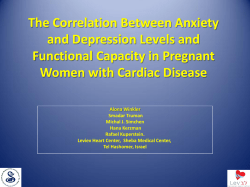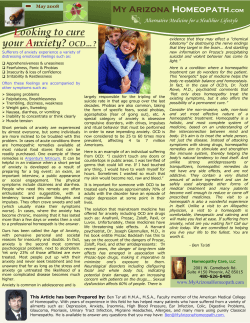
TREATMENT-RESISTANT DEPRESSION AND ANXIETY Catherine Howe, MD, PhD
University of Washington © 2012 TREATMENT-RESISTANT DEPRESSION AND ANXIETY Catherine Howe, MD, PhD University of Washington School of Medicine Definition of treatment resistance Failure to remit after 2 adequate trials of medication Includes remitters who relapse within a certain period of time Determining treatment-resistance Wrong diagnosis Inadequate treatment Treatment intolerance True treatment resistance Diagnostic issues Psychiatric Unipolar vs. bipolar depression Elevated rates of anxiety disorders in bipolar illness Medical Sleep apnea Thyroid dysfunction Substance Illicits Prescriptions: steroids, opioids, benzos Treatment adequacy DOSE of Medication DURATION of Medication TYPE of Medication – drug mechanism of action Adequacy of antidepressant treatment SSRIs: Citalopram 20mg Escitalopram 10mg Fluoxetine 20mg Paroxetine 20mg Sertraline 100 mg SNRIs: Venlafaxine 150mg Bupropion 300mg Duloxetine 60mg Mirtazapine 30mg TCAs: Nortriptyline 75mg Amitriptyline 200mg Desipramine 200mg Minimal treatment duration: 4 weeks (Recommendations from D. Dunner) Assuring appropriate type of medication Benzos do not work for PTSD TCAs do not work for social phobia Buspirone and Trazodone work ONLY for GAD Propranolol works only for performance anxiety Bupropion does not work for any anxiety disorder Treatment intolerance and nonadherence Hypersensitivity to medications (especially in patients with high anxiety and panic) Negative beliefs about treatment efficacy (negative placebo response; more frequent treatment dropout) Recovery and acute illness model (late non-adherence) Fear of medication “dependence” (sometimes confused also with fears of medication “addiction”) Prior adverse personal or familial experiences with medication Structural and other barriers to treatments—low income, culture and ethnicity Approaches to treatment intolerance Education and patient preparation (explanatory model, past experience, time course) Close monitoring for first few weeks Exposure with low dose, slow titration Side effects reframing consistent with patients own model of illness Treatment resistance: key factors Exogenous factors Comorbidity Unimodal treatment Treatment resistance: Exogenous factors Health Habits Caffeine Alcohol OTC cold preparations Nicotine (panic risk) Lack of exercise/ Deconditioning Sleep Deprivation Irregular sleep-wake cycle Life Events/Stress Acute Chronic (low SES; lack of social support) Substance Abuse Marijuana Cocaine Alcohol Effect of psychosocial stressors on treatment response Disturbed spouse and family relationships predict lack of remission in GAD (Yonkers et al 2000) Chronic life stressors (interpersonal, danger, loss) diminish effect of anti-panic treatment (Wade et al, 1993) Poorer SSRI response in low income patients (RoyByrne et al, 2003) Poorer social support and more life events predict PTSD chronicity (Udwin et al, 2001) Exercise is good for depression and anxiety Exercise is effective for mild to moderate depression (90 articles; Herring et al 2012) Exercise reduces cholecystokinin-induced panic (Stroehle et al 2005) Exercise is superior to placebo in reducing panic attacks and equal to medication in reducing anticipatory anxiety(Brooks et al, 1998) Treatment resistance: Comorbidity Major depression (especially recurrent, more severe) Anxiety disorders (especially various phobias) Personality Disorder Acute and long-term poor outcome predictor Substance Abuse Greatest effects on treatment engagement Alcohol also predicts poor outcome in engaged patients Treatment resistance: Unimodal treatment Underutilization of evidence-based psychotherapy, such as CBT Non-MD therapists may delay medication until therapy has failed--now patient is biased against therapy Treatment-resistance depression: Augmentation strategies Combining 2 antidepressants with complimentary mechanism of action or side effect profile Atypical antipsychotics eg., SSRI + bupropion, SSRI + TCA Use lower than antipsychotic dose, 6-8 week trial, discontinue if ineffective aripiprazole 10-15mg, olanzapine 5-10mg, risperidone 0.5-1mg, ziprasidone 60-80mg Lithium 600-900mg Liothyronine (Cytomel) 12.5-25mcg Treatment-resistance depression: Other approaches ECT Usually quick response Needs maintenance medication to prevent relapse MAO Inhibitors phenelzine 60mg selegiline patch 6-12mg/24h tranylcypromine 40mg Treatment-resistance anxiety: Pharmacotherapy Start with antidepressant baseline (SSRI, venlafaxine or mirtazapine) Wait long enough for complete response Adjunctive treatments Another antidepressant (esp. for panic disorder) Atypical antipsychotic for GAD or PTSD Anticonvulsant – pregabalin for GAD and social phobia, lamotrigine for PTSD, gabapentin for social phobia Buspirone for social phobia Prazosin for nightmares and hyperarousal in PTSD Simplify regimen after 6–12 months Treatment-resistance anxiety: Psychological treatment CBT Imagery rehearsal Mindfulness exercises Did we mention exercise?
© Copyright 2025





















